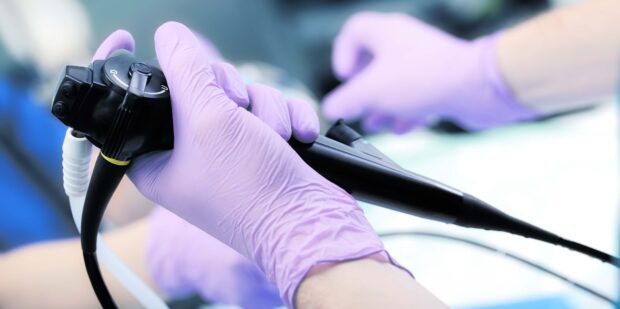Demand for gastrointestinal (GI) endoscopy in the UK is expected to increase over the next decade.
This is due to:
- increased patient expectations
- emphasis on early diagnosis
- changes to the NHS Bowel Cancer Screening Programme with the introduction of the faecal immunochemical test (FIT) and bowel scope screening
- better uptake of bowel cancer screening.
Pilot studies have shown that the introduction of FIT leads to an increased uptake of screening.
To meet demand, GI endoscopic procedures are increasingly being performed by nurses and other non-medical registered practitioners – known as clinical endoscopists (formally non-medical endoscopists).
Nurse endoscopists already undertake as much of 20% of the workload in an endoscopy unit. NHS Improving Quality initiatives have estimated clinical endoscopists could carry out up to 40% of low risk, high volume endoscopic procedures. And in 2015, the health secretary announced we would need to train at least 200 non-medical endoscopists by 2018 to support the rising endoscopy workload in symptomatic and screening services.
The NHS Bowel Cancer Screening Programme needs additional endoscopists to meet the rising need for both bowel scope and colonoscopy as part of the overall screening pathway.

Bowel scope screening
In 2013, Public Health England introduced bowel scope screening. This is a one-off flexible sigmoidoscopy (camera into the lower end of the bowel) test for all 55 year olds. Anyone who misses the opportunity at 55 can opt to have the test before they turn 60.
The roll-out of bowel scope screening is now being led by NHS England. It increases the need for clinical endoscopists in the NHS as screening centres need enough suitably qualified staff to deliver the extra workload.
Across the country, 63 screening centres provide bowel scope services, but many have challenges and delays in rolling out the programme to GP surgeries in their area. One reason for this is the shortage of clinical endoscopists to deal with the increased workload.
The accelerated clinical endoscopy training programme is a positive step towards meeting this workforce gap and we encourage individuals and services to look at the opportunities available.
Accelerated clinicial endoscopy training programme
Health Education England (HEE), working with the Joint Advisory Committee on GI Endoscopy, commissioned a pilot accelerated training programme to train suitably qualified registered health professionals to perform diagnostic procedures in either upper GI endoscopy or flexible sigmoidoscopy.
Two pilot trainee cohorts completed the 7-month training programme in 2016. Following positive evaluation by the Office for Public Management, this is being rolled out more widely.
To enable professionals to train within this accelerated timeframe, employers are expected to provide considerable local support, including:
- clinical supervision
- good access to clinical lists to enable trainees to complete the necessary 200 clinical procedures
In relation to bowel scope, students undergo training to become competent working in the symptomatic service before completing further assessments to perform bowel scope procedures.
How to apply
The programme is open to suitably qualified, registered health professionals, including nurses, clinical nurse specialists, diagnostic and therapeutic radiographers, operating department practitioners, specialist screening practitioners, nurse practitioners and clinical nurse specialists in cancer.
If you are interested in applying for the accelerated training programme or putting forward a candidate from your trust, please email diagnosticsprogramme@hee.nhs.uk.
Sign up to webinar to find out more
HEE is inviting senior trust leads in endoscopy/gastroenterology, radiotherapy and nursing, and anyone else with an interest in the accelerated training programme to sign up for a webinar on Tuesday 19 September or Wednesday 27 September (both from 1pm to 1.45pm).
The webinars will cover course content, the benefits of the course and the application process. They will coincide with the period of recruitment for the cohort of trainees starting in January 2018.
If you wish to attend one of the webinars please email diagnosticsprogramme@hee.nhs.uk and you will be sent a link.
PHE Screening blog
PHE Screening BLOG articles provide up to date news from all NHS screening programmes – replacing our previously published newsletters.
You can register to receive updates direct to your inbox, so there’s no need to keep checking for new blog articles.
2 comments
Comment by Sandra Everett posted on
I am 56. My GP Welling Medical Practice. Danson Crescent not offering bowell scope screening. Without going private how can I get this? My father had liver cancer and I have had breast cancer twice. I would like to be screened now.
Comment by Mike Harris posted on
Thank you for your message. The NHS bowel scope screening programme is gradually being rolled out by NHS England to all men and women in England aged 55.
If you have symptoms, are worried about a family history of bowel cancer, or worried about your bowel health in any way, you should speak to your GP.